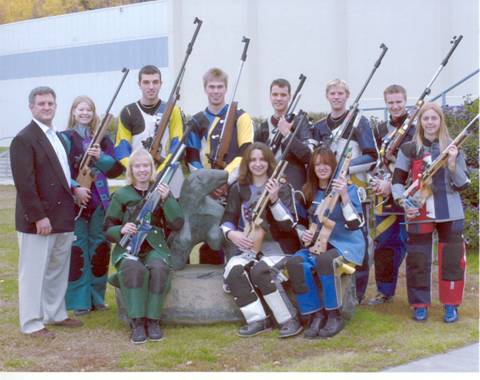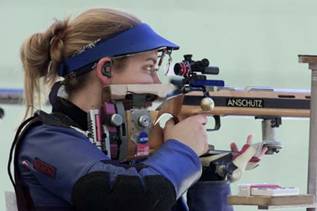| 
The University of Alaska Fairbanks rifle team
In Sight of the Northern Lights
In March of this year, the University of Alaska Fairbanks (UAF) rifle
team won its fifth consecutive NCAA Rifle Championship. Glenn Dubis, a
former member of the U. S. Army Marksmanship Unit and four U.S. Olympic
teams who joined the UAF staff last summer coached the team. The following
is a brief insight into Glenn's first months as the coach of a championship
team in a place often described as America's "Last Frontier."
Glenn Dubis' new job is quite different from his previous assignment.
One, after over 20 years as a competitor with the U.S. Army Marksmanship
Unit, Glenn is taking his first turn as a coach. Two, Fairbanks, Alaska,
is about as far away as you can get from the warmer climate of Fort Benning,
Georgia--without leaving the country. Glenn, however, will tell you that
he doesn't really mind the cold, even though during the past winter "it
never got above freezing." Or that on some days during the summer the
sun never completely goes down, or on some days in the winter, the sun
never comes up. Or that the UAF rifle team had to cross four time zones-14
hours one way by air-to get to this year's NCAA Championships.
It is just part of the challenge. And Glenn Dubis likes challenges.
Of course, it also doesn't hurt that the new coach inherited a top notch
rifle team. In March, the UAF rifle team won the NCAA Men's and Women's
Championships for the fifth consecutive year, a feat that has been accomplished
by only one other college team. As Glenn describes it, members of the
team "are self-motivated."
Thus far, his biggest challenge has been administrative-"learning all
that I didn't know at the beginning of the year." Mainly this concerns
NCAA rules and all the college-level paperwork required to run an NCAA
governed athletic team. In fact, according to Glenn, the result of this
administrative learning curve was the team being under coached during
the past year. "This was a conscious decision on my part," said Glenn.
"I felt the greatest risk to the team's success would be some administrative
oversight or rules infraction."
Success also breeds more paperwork. For example, a number of the members
of the team were worthy candidates for academic scholarships and awards,
having excelled both athletically and academically. Team member Matt Emmons
was nominated this past year by UAF for the Walter Byers post-graduate
scholarship program, a prestigious award offered by the NCAA valued at
over $20,000 for the first year of graduate study. Although Emmons was
not selected for the Byers program, he did receive other post-graduate
scholarship funding.
Working out the logistics for travel is also an arduous task. The UAF
team typically travels to matches three times a year. Glenn likened it
to "traveling with the US Shooting Team going to Europe. The travel is
long and hard, there are time changes of up to four hours to deal with,
and the team shoots multiple matches during the trip."
| Team
members typically bring schoolwork with them, and try to do work in
advance of a trip. Glenn also noted UAF faculty "are very willing
to work with a student-athlete who helps the instructor plan ahead
and who applies him or herself in their coarse work." He emphasizes
this point to his team when they prepare for matches. |
|
 |
There is also a clear
expectation that they put schoolwork ahead of shooting-"we in the athletic
department monitor as best we can the academic progress of student-athletes,
and plan our travel to limit the time spent away from the class room."
Part of Glenn's job as a coach, of course, is to help team members prepare
for the match. For Glenn, "this is an area that represents a new frontier
for me. As a shooter I only had to understand myself and be able to rely
on myself to get the job done. With a team, I now have to know and understand
the individuals that make it up. I am exited about this new aspect of
my professional life. I love to learn new things." |